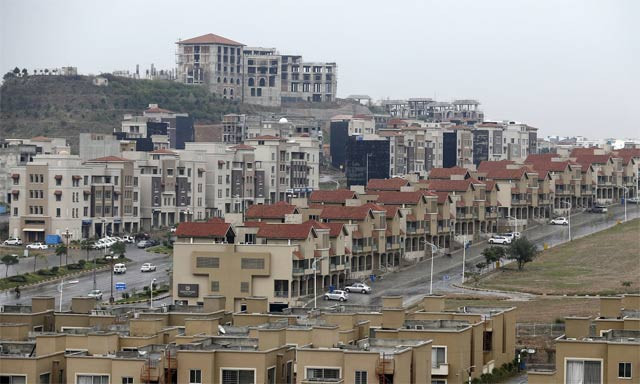Real estate sector: The govt has conceded more ground than it has gained
Tussle has come to an end, but at the cost of national exchequer

Tussle has come to an end, but at the cost of national exchequer. PHOTO: REUTERS
The real estate sector has recently agreed to pay taxes on new market values, which are up to 800% higher than the old rates, but still significantly lower than the current market rates (fair market value) of properties.
Analysts believe there was an alternative for the government.
“Instead of focusing on the rate of Capital Gains Tax (CGT), the government should have stuck with its earlier plans to force the real estate sector to pay all taxes on ‘fair market value’. This could have been an excellent move towards documentation of economy,” Invest & Finance Securities CEO Muzammil Aslam told The Express Tribune.
Real estate sector handed tax amnesty
While it is good to see the government emphasising on generating more taxes from the real estate sector, he said, the recent measures are not enough to resolve major problems of this sector.
Leading builders and developers who are associated with Association of Builders and Developers of Pakistan (ABAD) – a national-level body of over 700 builders and developers – believe measures taken in Income Tax (2nd Amendment) Ordinance 2016 will push investors away from property markets.

“Last week’s agreement between the government and the real estate sector would bring significant changes in property markets. But I do not agree with ABAD people that the sudden reduction in buying and selling of properties would hurt this sector in the long run,” said Aslam.
The real estate market has now turned into a buyers’ market from a sellers’ market. Now there is so much scrutiny from the government. But despite all these measures, the government now needs to attract investors and genuine buyers with white money in hand to bring the desired results, he added.
Why real estate sector preferred FBR over SBP?
In order to bring real estate in to the tax net, the government in Finance Bill 2016 made it mandatory to evaluate property prices through a third party under the notification of the State Bank of Pakistan (SBP).
‘Real estate no longer a safe haven for black money’
That was a quite shocking for many. From the first day the real estate sector was not happy with the government’s move to hand over such powers to the SBP, arguably the most trusted regulator in Pakistan.
However, the government backed off later and agreed to shift this power from the SBP to the Federal Board of Revenue (FBR). Now FBR is entitled to determine property value over which the government would calculate withholding tax (WHT) and CGT.
Shifting this power from the SBP to the FBR is astonishing because realty sector, like many other sectors, often accuses the FBR as one of the most corrupt institutions in Pakistan.
Moreover, the government agreed to reduce holding period of properties from five years to three years. It also reduced CGT rates significantly.
This means that a property seller would not have to pay any CGT if he or she holds property up to three years, however, those who sell their properties after two years but within three years would now pay 5% CGT. Those who sell after one year but within two years pay 7.5% and those who sell within one year would pay 10%.
Market observers say investors would now hold properties for three years to avoid CGT; effectively nullifying the government’s every effort to divert investments to more productive areas of the economy.
Real estate in Karachi to stay unaffected despite budget proposals
They say the government needs to take more measures to discourage the investment of black money in the real estate sector. “The government needs to think of an out of the box solution to stop investment of black money in real estate sector,” added Aslam.
Adviser to the Prime Minister on Revenue Haroon Akhter Khan, who played a critical role in negotiating with the real estate sector, accepted that trillion of rupees of black money are invested in property markets.
Perhaps the government is only half way close to its declared targets. Targets like bringing in more investments, reducing the huge demand and supply gap in housing units, collecting right amount of taxes from the real estate sector are still some of the difficult goals that the country needs to achieve.
The writer is a staff correspondent
Published in The Express Tribune, August 8th, 2016.
Like Business on Facebook, follow @TribuneBiz on Twitter to stay informed and join in the conversation.



















COMMENTS
Comments are moderated and generally will be posted if they are on-topic and not abusive.
For more information, please see our Comments FAQ